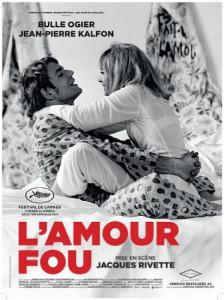
L’amour fou (1969) isn’t a TV series, not really — it’s a cinematic nervous breakdown, a 252-minute French psychodrama grenade tossed into the fragile wine-glass ego of the artist-muse relationship. Jacques Rivette directed this thing like a man slowly peeling his own skin off with a fountain pen — part documentary, part hallucination, part marital autopsy. The plot? A theatre director loses his marbles while staging Andromaque and simultaneously sabotaging his marriage. But that’s like saying LSD is just a chemical. No, L’amour fou is a fever-dream filmed through hangover gauze and cigarette smoke, where cameras slither behind the scenes, characters crack like cheap glass, and time itself feels like a drunken snake eating its own tail.
Rivette unspools the story like a paranoid mime in a locked room — there’s chaos, voyeurism, a 16mm film crew embedded like journalistic termites, and the whole damn thing could have been an existential prank on Godard. If you’ve ever wanted to see love, art, and ego punch each other in the throat for four straight hours, this is it. It’s raw, erratic, absurdly intimate — the kind of film that dares you to keep watching, then slaps you for looking. A gorgeous, spiraling collapse that feels less like storytelling and more like eavesdropping on a couple mid-divorce during an earthquake.
director: Jacques Rivette
cast: Jean-Pierre Kalfon, Bulle Ogier
notable: Groundbreaking cinéma vérité style, influential on the French New Wave's boundary-pushing later phase, often cited as a precursor to reality-blurring experimental film.





